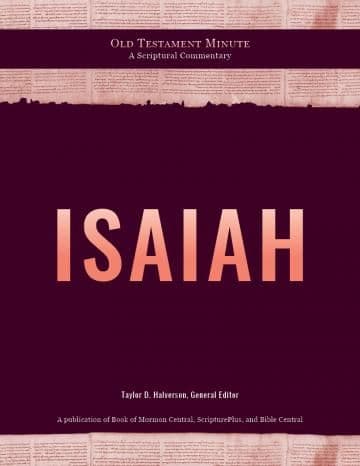Book
34 Chapters

The chapter break between chapters 31 and 32 should be ignored.
Note that Isaiah 32:1–2 again link righteousness with justice as we have seen many times before. Note also this parallel poetic expression:
“a king . . . reign . . . righteousness”
“rulers . . . rule . . . justice”
32:2. Verse 2 goes on to describe a kingdom where each man will be like a shelter and a refuge from the wind and storm and water in the desert and the shadow of a great rock in a thirsty land.
Then Isaiah speaks again of eyes and ears, this time suggesting “then the eyes of those who see will no longer be closed and the ears of those who hear will listen.”
32:4. The mind of the rash will know and understand and the stammering tongue will be fluent and clear.
32:5–8. These verses begin, “No longer will the fool be called noble, nor the scoundrel be highly respected” (another poetic parallel expression). Because “his mind is busy with evil: he practices ungodliness and spreads error concerning the Lord.” He goes on to describe the scoundrel who “makes up evil schemes to destroy the poor with lies, even when the plea of the needy is just.”
Like bookends, verses 1–4 describe a kingdom of righteousness while verses 5–7 describe a fool whose mind is busy with evil. But verse 8 is the bookend that goes back to the king that will reign in righteousness and reads, “But the nobleman makes noble plans, and by noble deeds he stands” (this is fine English poetry because it rhymes, but also a beautifully poetic way of referring back to the first few verses.
32:9–14. These verses are directed to complacent women (compare Isaiah 3–4) who feel safe in Jerusalem. Verse 10: “In little more than a year, you who feel secure will tremble. The grape harvest will fail, and the harvest of fruit will not come. Tremble, you complacent women. Shudder, you daughters who feel secure. Strip off your clothes; put sackcloth around your waists. Beat your breasts for the pleasant fields, for the fruitful vines and for the land of my people, a land overgrown with thorns and briars—yes, mourn for all houses of merriment and for this city of revelry. The fortress will be abandoned, the noisy city deserted. Citadel and watchtower will become a wasteland forever, the delight of donkeys, a pasture for flocks.”
Then Isaiah turns again in verses 15–20 to the theme of justice and righteousness. The wasteland described will persist until “the spirit is poured upon us from on high and the desert becomes a fertile field, and the fertile field seems like a forest. Justice will dwell in the desert and righteousness live in the fertile field.” Then a beautiful description of the results of righteousness follows: “The fruit of righteousness will be peace; the effect of righteousness will be quietness and confidence forever. My people will live in peaceful dwelling places, in secure homes, in undisturbed places of rest. Though hail flattens the forest and the city is leveled completely, how blessed you will be” (verses 18–20).
The image here is similar to what one sees in Doctrine and Covenants 45.
Book
34 Chapters
Items in the BMC Archive are made publicly available for non-commercial, private use. Inclusion within the BMC Archive does not imply endorsement. Items do not represent the official views of The Church of Jesus Christ of Latter-day Saints or of Book of Mormon Central.